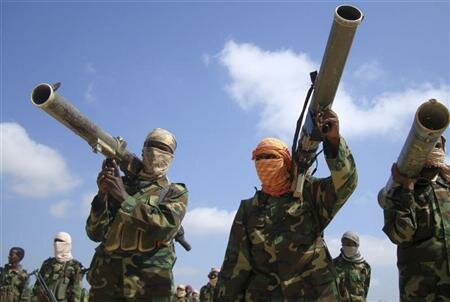 Bartamaha (Nairobi):-The United States is studying ways to foment division among Somali rebels behind bombings in Uganda, without inflaming anti-foreigner feelings that could cause a closing of ranks, a U.S. official said on Monday.
Bartamaha (Nairobi):-The United States is studying ways to foment division among Somali rebels behind bombings in Uganda, without inflaming anti-foreigner feelings that could cause a closing of ranks, a U.S. official said on Monday.
The double blasts, claimed by al Shabaab Islamists, killed 73 people watching the World Cup final on July 11. The group had threatened to strike Uganda to punish it for its contribution to AMISOM, the African Union peacekeeping force in Somalia.
The official, speaking on condition of anonymity, added that allies of Somalia’s interim government were discussing the possibility of allowing African peacekeeping troops to go on the offensive against the rebels in the wake of the explosions. At present they may use force only when attacked.
Asked what strategies the United States was using against extremist armed Islamist groups in Somalia, the official replied Washington would seek to divide them, although the task was delicate due to Somali sensitivities about foreign involvement.
“We know nothing galvanises Somalis like an outside influence…if we do something in an imprudent manner,” the official said in a briefing for reporters in London.
“We are trying to figure out the best way to exploit any divisions. At the same time, to do that in an incorrect manner runs the risk of the exact opposite, which is to unite them.”
Aside from its differences with other Islamist armed groups, al Shabaab itself is a patchwork of networks including foreigners who favour al Qaeda-style global attacks and more nationalistic Somalis, some analysts have said.
“Are they (al Shabaab) truly a Somali group at this point, or are they a puppet of an outside extremist group? It’s a question we’re looking at very closely,” the official said.
There were increasing signs that al Shabaab was adopting an international al Qaeda-type approach and it was important to try to prevent senior foreign militants from promoting this thinking among a middle tier of fighters.
The official said the estimated 1.5 million Somalis living overseas, who send home about $1 billion in remittances annually, were in a position to use their influence to deepen existing public antipathy to the rebels inside Somalia.
There was a “great possibility” this would happen because Somalis in the West were likely to experience more police scrutiny of their businesses after the attacks in Uganda and they were likely to blame al Shabaab for this.
“For them not to be able to function and do their business outside of Somalia would be a blow … And if al Shabaab endangers those remittances, I think that’s going to further alienate them from the Somali people,” the official said.
The official added that the Transitional Federal Government (TFG) was fighting for its survival against al Shabaab and was dependent on AMISOM, which he said numbered about 5,800 troops.
The official said there was “vigorous discussion” among Somalia’s allies about possibly widening the rules of engagement to enable the force to go on the offensive.
“Many folks think that’s the way to go, change the mandate from peacekeeping to an offensive posture,” the official said.
——————————
Source:-



